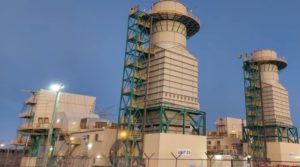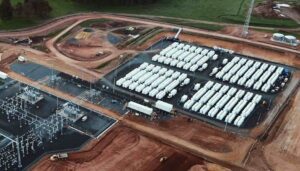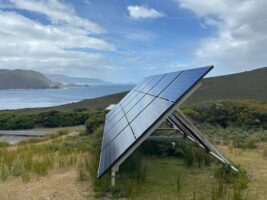Japanese electronics giant Panasonic – a partner with Tesla – to announce battery storage rollout with Australian utilities next week.
The rapid roll-out of battery storage products into the Australian electricity market continues apace, with Japanese electronics giant Panasonic to announce its move into Australia next week.
Panasonic is scheduled to announce its Australian plans with “some of” Australia’s leading energy Australian retailers on Tuesday in Sydney. It will likely include its now 6.8kWh PV-battery storage system.
This follows the announcement by Tesla last month of its battery storage product, which has been followed by AGL Energy’s teaming up with AU Optronics to deliver a 7.2kWh system into the Queensland market, Trina’s launch of its battery storage system, and expected rollouts from LG, Zen and other providers.
Panasonic is a partner with Tesla in the massive “giga-factory”, the first large scale battery storage manufacturing plant. It also provides the battery cells for its Tesla Model S electric vehicle.
The Nevada giga-factory is expected to focus on batteries for electric vehicles, but Tesla founder and CEO Elon Musk recently said that demand for his company’s Powerwall for households, and its utility-scale Powerpack was so great that the facility could reach capacity just with those orders.
Panasonic, which also makes solar modules, recently announced that it will unveil its new battery storage system at the InterSolar conference in Germany in June.
Panasonic describes the 1.4m x 96.6cm x 27.8cm system as “the perfect complement to existing and new solar systems on residential buildings”.
It says the AC-coupled, single-phase system contains long-established, high-performance lithium-ion batteries from Panasonic and has a storage capacity of 6.8 kWh.
“During development Panasonic has also taken into account the interests of energy suppliers that are developing ever-increasing decentralised energy supply solutions using third party regenerative systems.
“By interconnecting and benefiting from private storage systems energy suppliers can increase the flexibility of their energy supply. Storage units contribute to network stability and allow load management, so that investment in the development of local networks can be reduced.”
Panasonic first entered the residential energy storage in Europe in mid-2012, when it released a 1.35kWh module that was usually sold as a 5.4kWh system (four modules).
It said at the time that the storage system “will also enable households to reduce the dependence on grid power and facilitate the further spread of green energy.”











